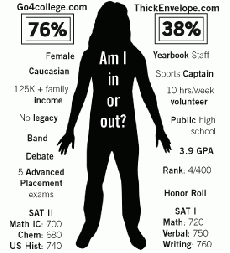A hypothetical high school senior has a 3.9 GPA and an SAT score of 2230. She is the captain of the volleyball team, a clarinetist and an active participant in both her school yearbook and the debate team.
And she has either a 38- or a 76-percent chance of getting into Penn, depending which college admissions prediction site she consults.
Web sites like ThickEnvelope.com or Go4College.com - which produced those two probabilities, respectively - are helping anxious high school students looking for a sneak peak into the envelopes that will reach their mailboxes in the spring.
These two sites are among the many admissions prediction services that have cropped up in the past few years as part of a booming college advising industry.
Users spend five to 10 minutes filling out a survey about their grades, test scores, activities, accomplishments, family background and the schools that they're interested in applying to. Once they submit their information, all they have to do is wait a few minutes until the company e-mails them their results.
Costs vary for the services, with individual trials running between $5 and $20, and several package deals are usually available.
Questions range from the basic to the blunt. ThickEnvelope, for example, asks clients: "Would you say that your mother or father is a nationally recognized, very important person or well-known celebrity?"
Christine Schuldt, a co-founder of Go4College, said that her company has made tens of thousands of predictions since it started in 2001. She said that the predictions are based on algorithms for each individual college. When students enter their information into the site, a computer program compares it to the student profiles at the specified schools.
Go4College assures its customers 98 percent accuracy.
Grant Ujifusa, a partner at ThickEnvelope, said that his company is able to make its predictions because the composition of a class from one year to the next is basically the same at most schools.
"We think we know how it works in statistically ordinary circumstances," he said. "In the end, what [admission officials] do is not rocket science. It's routine."
He said that his company has had 6,000 customers in the three years since he and his business partner, a former associate dean of admissions at Harvard University, founded the company in response to the anxiety they experienced when their own children were applying to college.
But experts warn students who use these services to keep in mind that, at best, the predictions are only ballpark figures.
Michele Hernandez, president of Hernandez College Consulting, said that these services can be fun, quick and easy as long as they're not considered the "be-all, end-all."
A really good guidance counselor could do the same thing for free, she said.
David Petersam, president of AdmissionsConsultants Inc., says that the services are not entirely reliable because schools are looking for students who are a good fit and may consider a number of intangible factors.
"It's not that simple. If it were, schools wouldn't have admissions staffs. They would just use a computer," he said.



